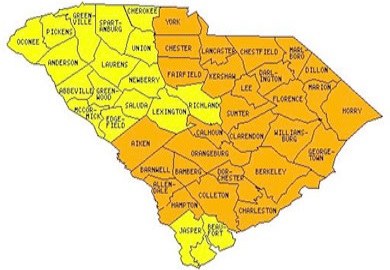DNR News
** Archived Article - please check for current information. **
July 16, 2015All of South Carolina now under drought status
The S.C. Drought Response Committee, meeting via conference call on July 16, has upgraded the drought status of the entire state. Previously on June 19 the committee had designated 28 counties to the first level of drought. Those counties are now in the second or moderate stage of drought.
The counties upgraded to the moderate stage of drought include Aiken, Allendale, Barnwell, Bamberg, Berkeley, Calhoun, Charleston, Chester, Chesterfield, Clarendon, Colleton, Darlington, Dillon, Dorchester, Fairfield, Florence, Georgetown, Hampton, Horry, Kershaw, Lancaster, Lee, Marion, Marlboro, Orangeburg, Sumter, Williamsburg and York. All other counties in South Carolina are now in the first level of drought or incipient.
The purpose of the moderate declaration is to increase awareness that drought conditions are intensifying. Water systems are asked to review their Drought Response Plans and Ordinances and implement as needed.
“It’s clear that drought is affecting folks all across the state. Irrigation has helped provide moisture to some crops, but it doesn’t replace a good soaking rain," said S.C. Department of Agriculture Commissioner Hugh Weathers. "This summer’s weather furthers illustrates the partnership that farmers have with Mother Nature. The short-term forecast isn’t optimistic, but we’ll continue to pray for relief from the heat and drought.”
"Duke Energy strongly supports the Drought Committee's moving the drought classification to moderate based on the very low stream flows, dry soil moisture and widespread low rainfall amounts over the last 30 days. Duke Energy is concerned with lake levels and is carefully managing hydroelectric operations under these conditions," stated George Galleher, principal engineer with Duke Energy.
“Due to below normal rainfall over the past several months, streamflow levels have dropped considerably and are well below normal for this time of year," reported Scott Harder, S.C. Department of Natural Resources hydrologist. "These low streamflows have caused small but steady declines in most of the state’s major reservoirs and most of the reservoirs are currently below their target levels.”
Bobby Brock with the Marlboro Water Company and Northeast Drought Committee said, “Several farmers in Marlboro County agree that the combination of hot weather and lack of rainfall is having an impact on their farming operations, particular those without irrigation. It certainly has affected the corn crop and will impact peanuts and soybeans if we do not get rain soon.”
According to Hope Mizzell, SC State Climatologist, “Rainfall totals within each county are highly variable, for example in York County some areas are reporting less than 2” since June 1 while others have received over 7”. Since our last Drought Committee meeting in mid-June, rainfall totals have decreased statewide. The drought impacts have been intensified due to the much above normal temperatures."
Drought Response Committee Chairman Ken Rentiers stated, "The Committee will continue to monitor the situation closely and if conditions deteriorate the S.C. Department of Natural Resources will reconvene the committee as needed.
More News
- All of South Carolina now under drought status
- Apply online for deer lottery hunts until Aug. 21
- Boating safety public meetings to be held around the state
- Bat surveys taking place across South Carolina
- Lights Out For Loggerheads! Sea turtle hatching season officially underway
- Two fishing lakes closed for renovation, restock
- Public invited to Columbia film screening, Q&A on Fort Frederick
- Submit a winning "Trashter Piece" and take home an iPad Mini 3
- DNR recognizes 2014 Employee of the Year
- Volunteers needed to participate in the Summer Turkey Survey
- DNR hosts series of youth fishing rodeos/family fishing clinics around the state
- Freshwater fishing trends
- Saltwater fishing trends
- S.C. weekly tidetable
- DNR video
- Archived news releases
